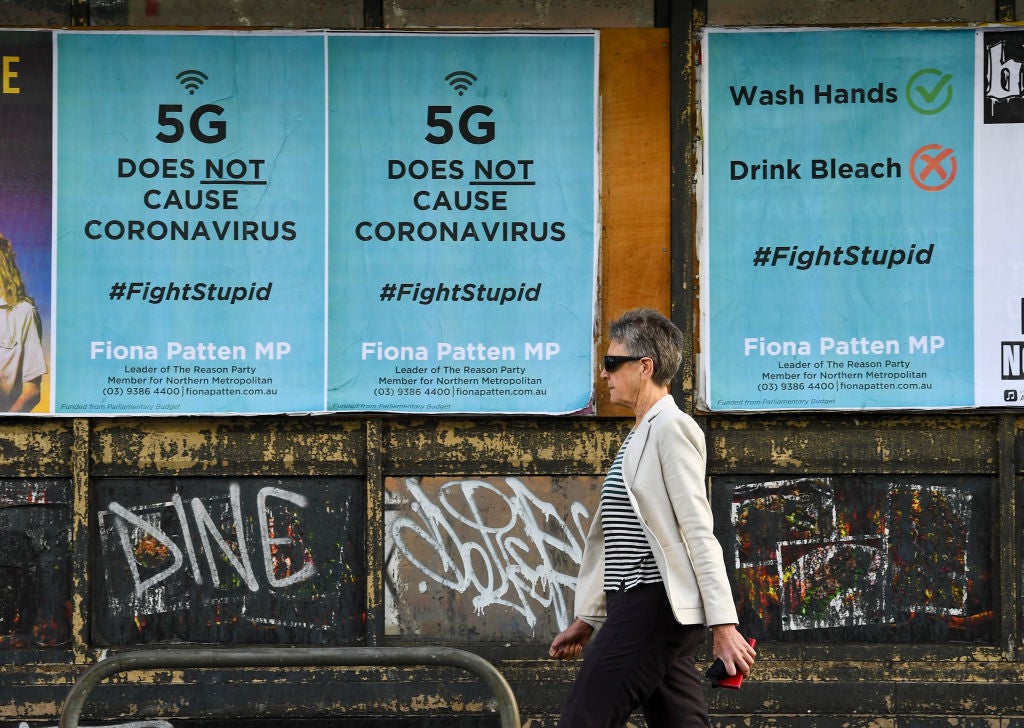Coronavirus conspiracy theories could be a fast-track to Holocaust denial
In these turbulent times, extremism is on the rise. It’s more important than ever we stand together against hate and misinformation

Your support helps us to tell the story
From reproductive rights to climate change to Big Tech, The Independent is on the ground when the story is developing. Whether it's investigating the financials of Elon Musk's pro-Trump PAC or producing our latest documentary, 'The A Word', which shines a light on the American women fighting for reproductive rights, we know how important it is to parse out the facts from the messaging.
At such a critical moment in US history, we need reporters on the ground. Your donation allows us to keep sending journalists to speak to both sides of the story.
The Independent is trusted by Americans across the entire political spectrum. And unlike many other quality news outlets, we choose not to lock Americans out of our reporting and analysis with paywalls. We believe quality journalism should be available to everyone, paid for by those who can afford it.
Your support makes all the difference.The past year will forever be marred by the global pandemic that spread around the world, locking us in our homes, forcing us to hide our faces behind masks, and tragically taking hundreds of thousands of lives. However, while the arrival of numerous vaccines provided a shard of light in the seemingly unending darkness of last year, the ramifications of the pandemic will continue to be felt for years to come.
Alongside the more obvious effects of the global pandemic, such as economic turmoil and unemployment, is the as yet unclear long-term effect of the dramatic increase in numbers of people engaging with conspiracy theory content online. How many of us have a friend or family member who has gone down the rabbit hole in the past year?
Whether it is conspiracy theories about Covid-19 being a hoax, 5G being dangerous or the rise of QAnon in the UK, a worrying number of people have come to support conspiracy theories over the past year. One of the most concerning elements of this is that amidst this online world of fake news, misinformation and conspiracy theories is the pernicious lie of Holocaust denial.
It is tempting to dismiss conspiracy theories as amusing or strange. Those that push them have often seen as harmless eccentrics who gather in dingy pubs and frequent peculiar corners of the internet. In truth, though, conspiracy theories are the lifeblood of hateful extremism. They provide an “evil enemy” that can be blamed for world events and personal misfortune.
The reasons behind the rise of conspiracy theories are complex, but such theories do provide a simplified and monocausal framework for interpreting unpredictable and bewildering events taking place across the world. It is no surprise, then, that belief in conspiracies tends to spike in popularity during turbulent times; times like right now.
One of the major concerns about more people engaging with conspiracy theories is that all too often, if you scratch the surface of a conspiracy theory, you quickly find antisemitism. Belief in a conspiracy theory requires belief in a conspirator and all too often it is Jews that have, for centuries, faced the blame.
For some, the belief that a secret cabal of Jews secretly run the world creates an insurmountable contradiction. How could a supposedly “all-powerful” people have “let” the Holocaust happen? For die-hard antisemitic conspiracy theorists, the answer is that they didn’t and the Holocaust is a lie.
In the past year, my team at the anti-fascist organisation HOPE not hate has monitored antisemites and Holocaust deniers spreading their lies on social media, who specifically target people who believe in other, less obviously pernicious conspiracy theories. We have watched in real-time some of those who started as anti-lockdown or anti-5G activists become radicalised towards antisemitism, Holocaust denial and even adopt veneration of Hitler.
Traditionally, the route to becoming a Holocaust denier was through more moderate forms of antisemitism and far-right politics. The recent explosion of conspiracy theories opens up an alternative route to denial through other conspiracy theories, some of which are antisemitic but some of which are not. This all begs the question of whether the rise in conspiracy theories during the pandemic has created a fast-track towards Holocaust denial?
In the face of this challenge, remembering the truth of the Holocaust remains as important as ever. Some things are true. Some things happened. When it comes to the Holocaust, there is no room for “alternative facts” or manufactured theories. The Holocaust happened and we have to remember that.
It is for this reason that Holocaust Memorial Day continues to be so important, as a day in which people come together in these difficult times and unite against prejudice. To do that this year the Holocaust Memorial Day Trust is asking us to light a candle and safely place it in your window at 8pm on 27 January. To remember those who were murdered for who they were. To stand against hatred and division today.
Joe Mulhall is senior researcher for Hope not hate.



Join our commenting forum
Join thought-provoking conversations, follow other Independent readers and see their replies
Comments